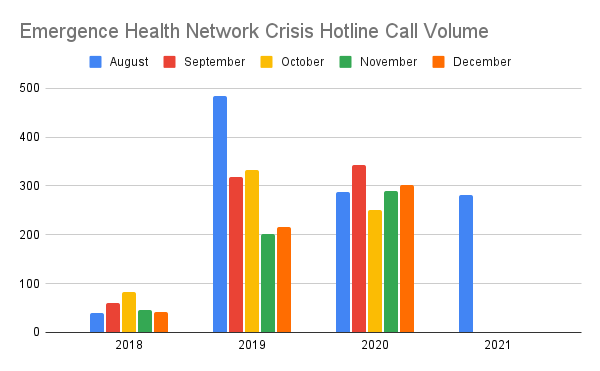Borderland grapples with growing mental health demand
Crisis hotline call volume surges in wake of Aug. 3 Tragedy, Pandemic
EL PASO, Texas – The argument could be made that no community has had to endure more since 2019 than the Borderland.
Twenty-three people were gunned down while shopping at the Cielo Vista Walmart on August 3, 2019. Dozens more were wounded. A close-knit community was left reeling.
Months later, the world as we knew it changed with the onset of a global pandemic.
Businesses and schools went virtual, restaurants and bars closed and countless entertainment options were canceled.
In November 2020, El Paso became the nation’s Covid-19 hotspot. Hospitals were bursting at the seams and the county had to rely on mobile morgues – refrigerated trailers outside the Medical Examiner’s Office – to store the bodies of Covid victims.
As of late February, El Paso County alone is reporting more than 3,200 lives due to Covid-19.
The stunning loss of life – in addition to the loss of everyone’s normal way of life – left many reeling and spiked a new demand in mental health services.
“We've been devastated the last two years with just crisis and trauma and complex grief, the loss of normalcy and companionship and family and closeness," Celeste Nevarez, the Chief of Clinical Services at Emergence Health Network, said. “The overall mental health of our community is something I'm deeply concerned about.”
A Surge in Crisis Hotline Calls
Emergence Health Network, which provides mental health and intellectual/developmental disability services to El Paso County residents, saw an exponential rise in the number of calls to its crisis hotline.

They grew from 40 in August 2018 to 484 one year later, also the month of the mass shooting. A slight decline followed, but the call volume remained above 250 monthly before rising again during the pandemic in 2020.
“The loss of job, changes in our social life, our financial life, all areas of our lives have been impacted in the last 24 months. The mind and the body are connected by the neck. If it is affecting the rest of our body, it's definitely affecting our mental health,” Nevarez said.
Leonard Martinez, a lifelong El Pasoan, first addressed his mental health more than a decade ago. He was diagnosed with depression, anxiety and panic disorder and began seeing a psychiatrist. Monthly visits became less frequent over time, even going more than a year without a single visit.
That was until the onset of the pandemic.
“Things were becoming a bit dire during the pandemic, just overwhelming thinking of the illnesses that people were getting and going to the hospital," Martinez said.
He cited the images of the lockdown in Italy as the moment it became real – and he recognized he needed to seek more help.
“There is a part of you that thinks maybe I'm even a loser. Like, I thought I defeated this. I thought I had been victorious over this. There is that tiny voice that says that, but that's not the case. That first obstacle is ourselves and trusting your gut something is off. The first step is the scariest, but it’s the one that leads you on the path to good mental health."
Rise in Demand for Mental Health Help – Not Necessarily a Bad Thing
At face value, the surge in crisis hotline calls could be a cause for concern. There is no question the Borderland has endured significant trauma in recent years.
But the rise in calls also means there is more willingness to ask for help.
“That was once an untouchable topic,” Nevarez said. “In the last few years, more and more people have really normalized that, which is great because people are reaching out. It doesn’t have to be a mental health crisis or a meltdown or mental breakdown. It can be, ‘I’m just not feeling my best self.’”
It’s not just Emergence Health Network seeing that rise in demand.
The El Paso Child Guidance Center just broke ground this month on a $3 million expansion to serve the growing need. Just this past January alone, the center helped 1,400 children – 76% more in one month than the number of children it saw in all of 2018.
Nevarez believes as more people get comfortable with the idea of reaching out and making that initial call, the Borderland’s overall mental health will improve.
"My concern is for the folks that do not reach out and are continuously suffering in silence, whether it be through the complex trauma of August 3, or the changes during Covid-19. Whatever traumas they've endured are compounding over time and it can become a more serious issue."
Available Mental Health Resources in the Borderland
EHN Crisis Hotline: (915) 779-1800
Toll Free Crisis Hotline: 1-877-562-6467
General Services: (915) 887-3410
201 E. Main, Suite 600
El Paso, TX 79901
2701 Yandell Dr.
El Paso, TX 79903
(915) 562-1999
201 East Main St., Ste. 600
El Paso, TX 79901
(915) 778-5726
Amistad Family Counseling Center
3210 Dyer St.
El Paso, TX 79930
(915) 298-1132
Project Vida Health Center Telehealth
3607 Rivera Ave.
El Paso, TX 79905
(915) 465-1191
El Paso United – Aug. 3 Family Resiliency Center
6314 Delta Dr.
El Paso, TX 79905
(915) 775-2783
Statewide COVID-19 Mental Health Support Line
(833) 986-1919
24/7, toll-free
